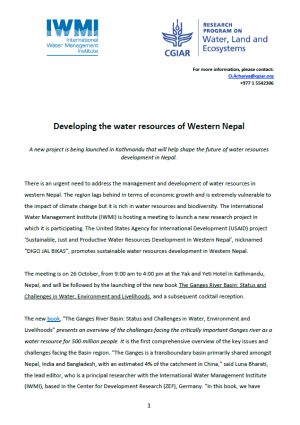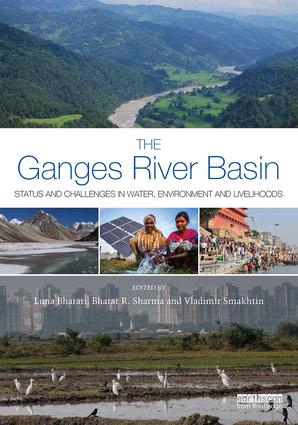A new project is being launched in Kathmandu that will help shape the future of water resources development in Nepal.
There is an urgent need to address the management and development of water resources in western Nepal. The region lags behind in terms of economic growth and is extremely vulnerable to the impact of climate change but it is rich in water resources and biodiversity. The International Water Management Institute (IWMI) is hosting a meeting to launch a new research project in which it is participating. The United States Agency for International Development (USAID) project ‘Sustainable, Just and Productive Water Resources Development in Western Nepal’, nicknamed “DIGO JAL BIKAS”, promotes sustainable water resources development in Western Nepal.
The meeting is on 26 October, from 9:00 am to 4:00 pm at the Yak and Yeti Hotel in Kathmandu, Nepal, and will be followed by the launching of the new book The Ganges River Basin: Status and Challenges in Water, Environment and Livelihoods, and a subsequent cocktail reception.
The new book, “The Ganges River Basin: Status and Challenges in Water, Environment and Livelihoods” presents an overview of the challenges facing the critically important Ganges river as a water resource for 500 million people. It is the first comprehensive overview of the key issues and challenges facing the Basin region. “The Ganges is a transboundary basin primarily shared amongst Nepal, India and Bangladesh, with an estimated 4% of the catchment in China,” said Luna Bharati, the lead editor, who is a principal researcher with the International Water Management Institute (IWMI), based in the Center for Development Research (ZEF), Germany. “In this book, we have made an attempt to comprehensively cover the various aspects of the Ganges basin from a biophysical, socioeconomic and political perspective.
“Working on water futures is especially exciting in Nepal because water resources development is still in its infancy,” said principal researcher and project leader Luna Bharati. “This makes it a critical time to assess any basin level development through the perspective of river health, economic productivity, social equity and sustainability.”
This 3-year project and its findings will help shape the future of water resources development in Nepal. The inception meeting will include talks from key stakeholders, descriptions of the work packages from the research leaders, and dialogue among participants on challenges and opportunities.



